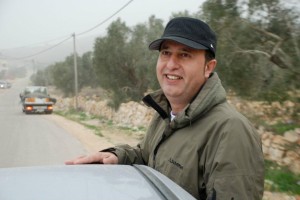By Jennifer Yeatts
Jennifer Yeatts studied English Education and Creative Writing at Northern Michigan University and received an MFA in poetry from the University of Idaho. She is the Senior Editor of Dunes Review and serves on the board of Michigan Writers. A longtime barista and coffee professional, Jennifer manages social media, marketing and training at Higher Grounds Trading Co. in Traverse City, Michigan.
“Being good should always be good for business.”
These are the words of Nasser Abufarha, founder of the Palestine Fair Trade Association & Canaan Fair Trade. He and I sat down last year during his visit to Traverse City for the premiere of The People & the Olive, Stone Hut Studios‘ documentary about On the Ground’s Run Across Palestine back in February of 2012.
Nasser is a stylish, stately and well-traveled man, but he also carries a self-ease that made me immediately comfortable. I had scribbled down a few questions to ask him: about the highlights of his visit to Northern Michigan (HG owner Chris Treter’s wedding, touching base with the runners he’d met in Palestine, and salmon fishing near Honor), what the film represented for him (a way to bridge communities not connected through politics but able to connect through food), and what’s on the horizon for PFTA and CFT (almonds, a new crop for farmers there; new markets in Europe). Through all of these subjects, our conversation kept coming back to one thing.

Nasser Abufarha
“What’s the biggest challenge in your line of work?” I asked.
“Managing the growth,” replied Nasser, “staying focused on the mission, and keeping small attitudes.”
Small attitudes. That phrase resonates with me. In the midst of steady growth as a business — something currently experienced by both Canaan Fair Trade and Higher Grounds — maintaining our commitment to justice and our valuable relationships with farmers is essential. It would be easy to get caught up in the excitement of growth and expansion; more business obviously means more consumers are aware of our product, and brand recognition is spreading. We could ride the wave and follow the corporate and societal model that says bigger is better. But even though our pocketbooks might win, without nurturing the mission that motivated the very birth of our organization, without keeping our egos in check and our attitudes small, we could lose sight of what really matters: community.
“[At Canaan], we want to create a model of community,” Nasser explained, “where we work together based on certain shared ethics. Building it, having it be visible while showing the capacity to succeed. Business doesn’t need to be unfair or exploitative to be successful.”
There’s a dual pressure in any business selling goods, a positive tension between the producer base and the customer base: you need to have one to have the other, and when you strengthen one, you strengthen the other as well. And it’s important to demonstrate transparency in the structure and financing of our company, illustrating the components of a sustainable business so that everyone in the community understands our role and how we work, even behind the scenes. Equally important is that our business recognizes our connection to the community that surrounds us and uplifts us. The day after my chat with Nasser, I was accompanying Ruth, HG’s bike delivery girl, on her route (to get a feel for her job & meet some of the people she sees regularly). One of our last stops was the Oviatt House Bed & Breakfast on 8th Street, where we delivered two five-pound bags of coffee and two bottles of Palestinian olive oil. As we parked our bikes, we were greeted in the driveway by Franny and Ken, the owners, and by Nasser, who was staying there. It was the perfect manifestation of Higher Grounds’ mission: connecting our global community with our local community. And even when we don’t all meet face to face, we’re still close-knit, via the path our products travel from the field to us.
We completely agree with Nasser that our success as a business should never rely on unfair or exploitative practices; in fact, I’d hesitate to call those things “successful” at all. We treat our workplace environment as a community as well; we’re definitely a family around here. Personally, I can say that I feel appreciated and respected by my coworkers for what I do. That in itself makes me want to do the best job I can, which benefits not only Higher Grounds but my wellbeing too. So I’ll repeat Nasser’s words, a declaration that rings true to us here at HG and will echo in my brain for all time: Being good should always be good for business.






Comment